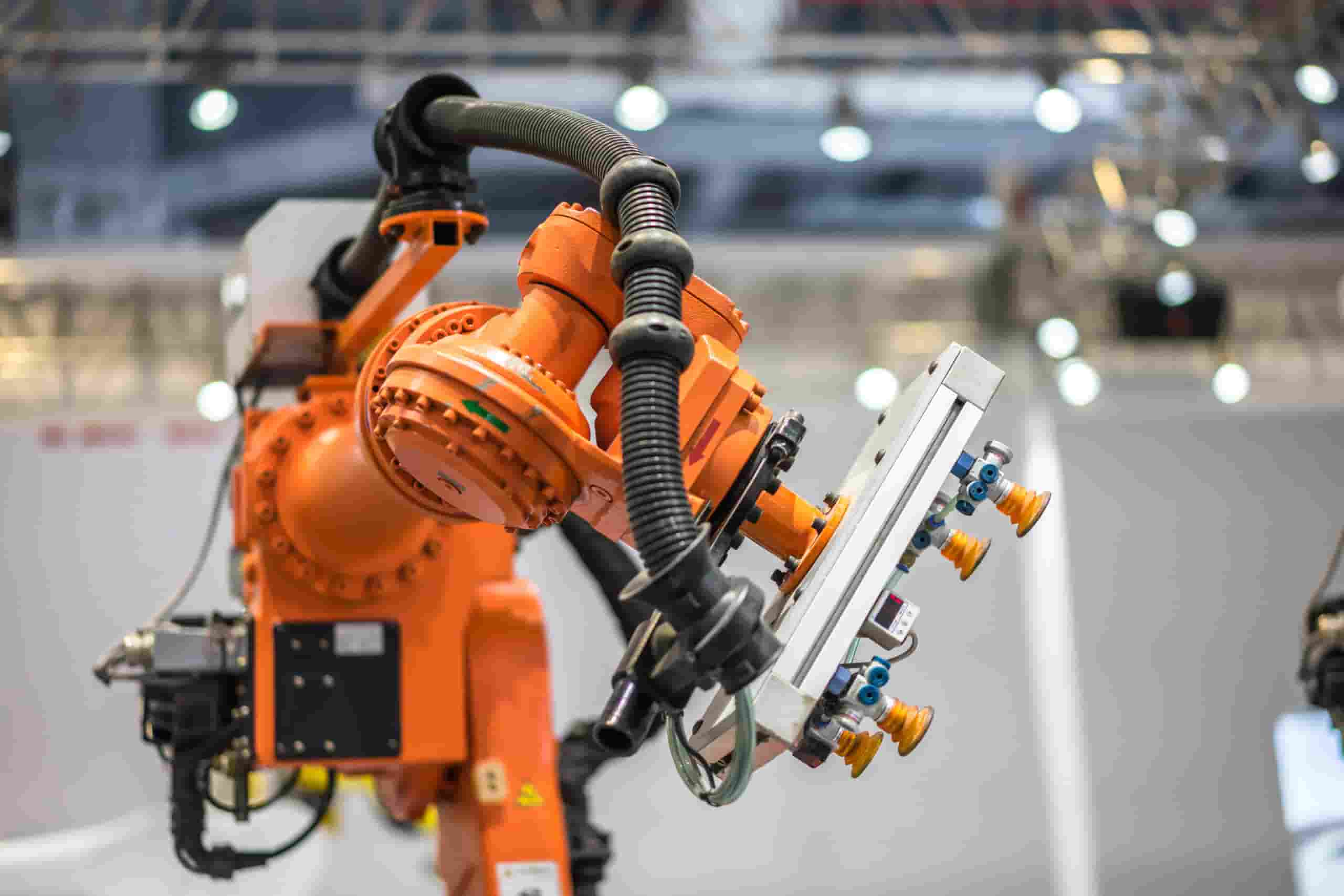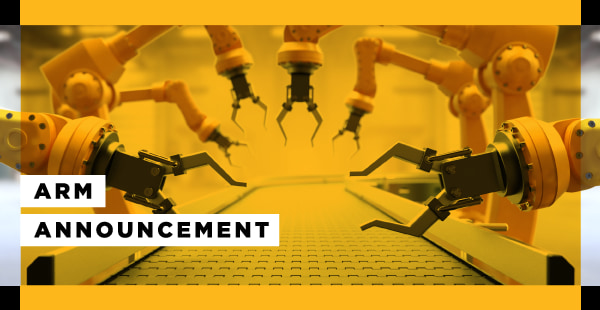ARM Announces Second Education & Workforce Development Project Call
PRE-SOLICITATION OVERVIEW
To best protect and pursue our interests at home and abroad, the United States relies on a robust and innovative domestic manufacturing sector. Advanced Robotics for Manufacturing (ARM), a national, public-private partnership among leaders in industry, academia, and nonprofits, was established to develop, demonstrate and accelerate the early adoption of novel robotic solutions by funding technology and workforce training projects and by creating an ecosystem that advances robotics technology and education. Increased productivity gained by collaborative robotic automation will help create new jobs to build, manage, and maintain the robots, promote on-shoring by manufacturers, and replace dangerous jobs with safer jobs.
TIMEFRAMES
ARM will post an Education & Workforce Development Project https://arminstitute.org/news/ewd-fall-2018-project-call/Call on October 17, 2018 in the ARM Member Community and hold a webinar at 2:00 pm ET on October 17, 2018. You can sign up for the webinar here.
Step 1: Concept Paper Submission Nov. 30, 2018
Step 2: Full Proposal (by invitation only) Feb. 15, 2018
Questions regarding this pre-solicitation notice and the actual solicitation will be answered during the October 17 webinar. We kindly request that you save your questions for this venue. Questions after the October 17 webinar can be submitted via the ARM Member Community.
CRITERIA
Advanced Robotics for Manufacturing (ARM) is currently soliciting proposals that respond to specific needs of manufacturers as they relate to “Work and Learn” educational programs to engage individuals with both a classroom and on the job training experience. Proposals could focus on a variety of topics including, but not limited to, transitioning veterans and/or under employed and underrepresented groups in the talent pipeline who may hold similar skills and training in robotics and automation. A component of the ARM Education and Workforce Development mission is to train, certify and offer internships, robotics apprenticeships and externships to students and educators through increased awareness of advanced manufacturing careers by member industry organizations. An additional mission goal is to address diversity by incorporating a broad range of groups into ARM education and training program. The topic areas in this call for proposals seeks to use these two goals to ensure a continued skilled pipeline of workers into these industries.
Proposed projects should feature innovations and/or scalability in education and/or robotics training that enable more U.S. citizens to move into positions in the advanced manufacturing workplace. The culmination of the robotics program should result in workers who find employment in advanced manufacturing facilities. Proposal teams may include a variety of organizations that have vested interests in this “Work and Learn” program. Many types of organizations could participate and benefit from the results of this project. Examples include: Two and four-year colleges, Workforce Investment Boards (WIBs), unions, Manufacturing Extension Partnerships (MEP), industrial training centers, large corporations and small and medium manufacturers (SMM). As examples, possible teams might be comprised of a large manufacturer, a two-year college and a SMM(s); or a robotic manufacturer, an MEP, an industrial training company, and an SMM. Note however, that every team must include at least one manufacturer or industry representative.
The following topic areas for this project call represent the top priorities from the ARM education and workforce development road mapping process, which integrates the input of manufacturers with a strategic view on the future of manufacturing. Successful proposals will clearly identify project deliverables and the benefit to other ARM Institute members. Please note that the topics described below are deliberately broad.
Topic Area 1: Work and Learn, Transitioning Military
According to a Deloitte/Manufacturing Institute report [1], more than three million manufacturing jobs are expected to open from 2014 to 2024; however, the same study estimates manufacturers will be unable to fill two million of them. Therefore, finding and developing talent is essential. When asked to cite the most effective skilled production workforce development strategies, 49% of executives answered, “the creation of new veteran hiring programs.” This population is particularly well oriented for working in advanced manufacturing. Veterans value rules and procedures, safety protocols are familiar to them, and a team approach is engrained in their training.
ARM invites applicants to develop a program or model that will translate the skills and competencies military personnel acquire to the skills and competencies required in manufacturing facilities. Creating or adapting a system that translates these competencies and allows manufacturers to hire United States warfighters is the purpose of Topic Area 1.
A Military Occupational Specialty (MOS), Air Force Specialty Codes (AFSC) and a Navy Enlisted Classification (NEC) are unique designations to identify an enlisted service member’s job in each branch of the US Military. These competency descriptions work well for designating skills needed for a military job in but do not translate well for civilian jobs. However, most of the competencies and expertise learned for some MOS are very close to what manufacturers need. Add to that the previously mentioned attributes of values, teamwork, and adaptability makes this population an important solution to our current and future workforce.
Suggested Project Outcomes:
A. Develop a program or model to support transitioning veterans
- i. Develop a cross-walk to aid veterans in matching skills from MOS to careers in advanced manufacturing, with emphasis on robotics and automation
- ii. Provide component of paid on-the-job training
- iii. Address employees who meet employability requirements but need additional training to meet civilian job requirements
- iv. Seek connections with 2 and 4-yr colleges in close proximity to a military base to provide civilian training during 6-mo transition from service
Topic Area 2: Work and Learn, Underemployed Employees
Underemployment is defined as the under-use of a worker due to a job that does not use the worker’s skills, does not require a full-time schedule or leaves the worker idle. Although we cannot identify the total number of underemployed workers, the Bureau of Labor Statistics measures workers who are working part-time because they could only find part-time work [2]. In January 2018, 43.4% of college graduates were underemployed [3].There are many underemployed workers from other industries that have potential to thrive in advanced manufacturing. Some are working several part time jobs, working with little opportunity for advancement, and many are working without benefits.
The second topic area asks proposers to devise a program or model that will match skills and competencies that employees from other industry sectors have that fit well with skills and competencies needed in manufacturing. The purpose will be to recruit employees from another sector to consider a career in advanced manufacturing and provide work and learn opportunities for them.
A. Suggested Project Outcomes:
- i. Develop a training or reskilling/refresher program for individuals who are in either a completely different industry sector (retail/hospitality) or similar industry sector (construction) than manufacturing to expedite their competency building.
- ii.Create partnership for training for advanced manufacturing using robotics or automated processes job with a member (2 or 4-year college, training center, manufacturer)
- iii. Incorporate work experience provided through member industry partners
Topic Area 3: Work and Learn, Open Topic
ARM understands the importance of identifying populations outside of veterans and underemployed who can fill needed manufacturing jobs with specific skills in robotics and automation. The third topic area will continue the work and learn model but could include populations outside of the ones mentioned in the first two topic areas. Additionally, it provides the option of a non-paid opportunity for on the job training. This topic will allow proposers to expand their pipeline approach to K-12, gender specific and other underserved populations. Proposers should develop a work and learn model or program beyond the parameters set by the first two topic areas.
A. Suggested Project Outcomes
- i. Develop a work and learn model/program or a non-paid internship as part of an academic/training program with a member partner
- ii. Support the talent pipeline from any level (K-Gray) to gain training and work experience or an introduction to an advanced manufacturing experience
Topic Area 4: Talent Attraction, Open Topic
Although talent attraction is implied in each of the first three topic areas, the final proposal opportunity focuses only on talent attraction without the parameter of work and learn models. Through this topic area, ARM is soliciting unique program or model ideas targeting specific talent populations to increase the size and/or the diversity of the robotics and automation advanced manufacturing workforce pipeline. Successful proposals will include a program and talent population below or one of the proposers’ own choosing that fits in the ARM EWD mission.
Examples of programs: pre-apprenticeship programs, robotics technician training, robot competition programs, robotics training programs, mentoring/shadowing programs, robotics boot camps, etc.
Examples of talent populations: women, underserved, veterans, disabled, ex-offenders, underemployed, workers from at-risk industries, residents from at-risk communities, 2-yr college students, high school students, etc.
[1]http://www.themanufacturinginstitute.org/Research/Skills-Gap-in-Manufacturing/~/media/FF00360FC3344AD9B62F600B9FDEBD5B.ashx
[2]Chohan,Usman W. “Young, Educated and Underemployed: Are we Building a Nation of PhD Baristas” The Conversation. September 13, 2016
[3]https://www.statista.com/statistics/642226/underemployment-rate-of-us-college-graduates-by-major/
About ARM – Advanced Robotics for Manufacturing
ARM (Advanced Robotics for Manufacturing), a Manufacturing USA® institute, accelerates the advancement of transformative robotic technologies and education to grow U.S. global manufacturing competitiveness. Founded in January 2017 by Carnegie Mellon University, ARM operates as a separate non-profit member collaborative. Learn more at www.arminstitute.org. Follow us on Twitter at @ARM_Robotics.

